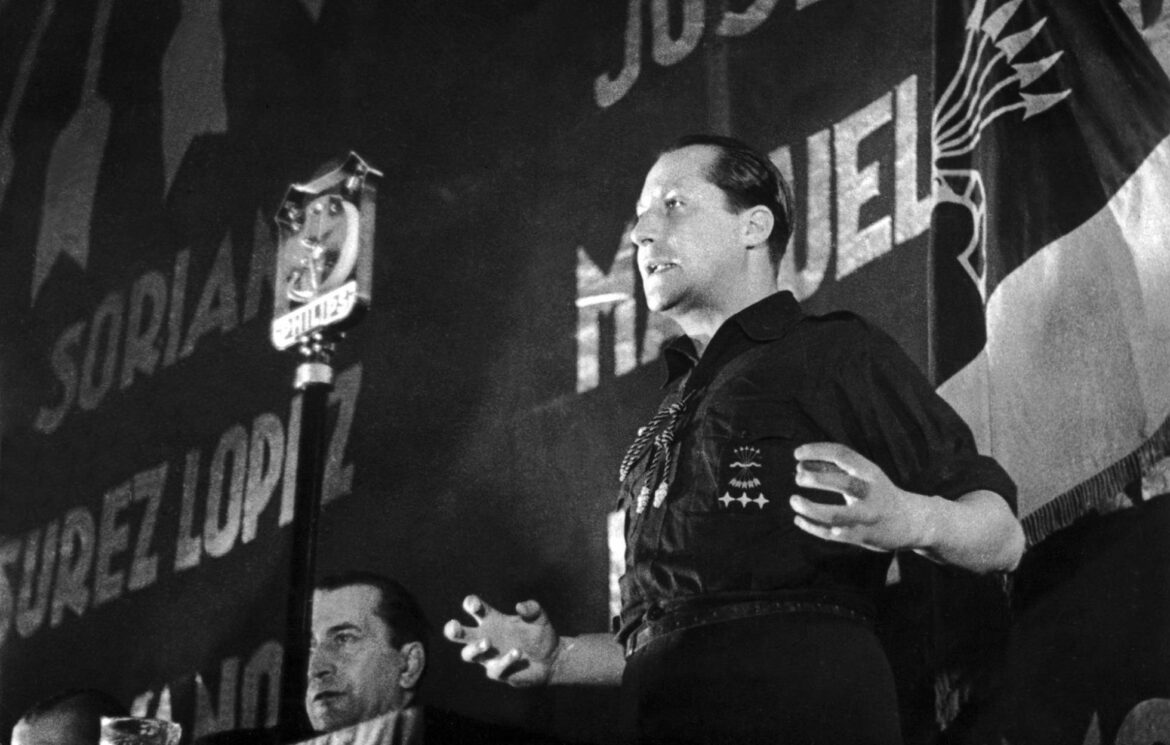On 24 April, José Antonio Primo de Rivera’s remains were exhumed and removed from the basilica in the Valley of Cuelgamuros in the outskirts of Madrid to a private niche in the San Isidro cemetery. Why is this a big deal, and why did the Spanish government push for Primo de Rivera’s exhumation?
José Antonio Primo de Rivera founded the Spanish Phalanx (Falange) in 1933, a party inspired by the Italian Fascists. The Falange was later integrated into a larger coalition of far right and Fascist parties which played an important role during the coup d’état in 1936 which evolved into a full-blown civil war in Spain. The Falange provided ideological and political support to the dictatorship, led by General Franco, which emerged from the ashes of the war in 1939. Unsurprisingly, the Falange was the only legal political party during the Franco regime.
However, Primo de Rivera himself had been executed by the Spanish government after being found guilty of conspiracy and rebellion at the onset of the Civil War, in November 1936. Primo de Rivera became a martyr for the Falangistas and Francoists, and his remains were buried with honours by the Franco regime in the Valley of the Fallen, where they remained until 2023.
The remains of Franco himself were taken away from their public tomb in the Valley of the Fallen in 2019. Similarly, the corpses of other leaders who had a role in the coup in 1936 or in the subsequent dictatorship, such as General Queipo de Llano, have also been removed from the places of honour where the regime had buried them, including churches and mausoleums.
This string of exhumations was met with opposition in some quarters. Besides the usual suspects (a sad bunch of a dozen Francoists congregated just outside the basilica as Primo de Rivera’s body was carried away), leaders in the centre-right Popular Party (PP) and in the hard-right Vox criticised the exhumation.
Obviously, there is a case to be made that the current government, a left-wing coalition headed by Prime Minister Pedro Sánchez, is using the exhumation of Primo de Rivera and other far-right figures for electoral reasons (Spain celebrates general elections in 2023). But that does not invalidate the underlying rationale: dictators, and those closely associated with them (military-men, policymakers and ideologues) should not be buried with honours in a liberal democracy. Someone who aided and abetted a repressive regime should not be buried as a hero in a country whose political system claims to be predicated in values diametrically opposed to Fascist totalitarianism.
The criticisms hurled at the decision to remove Primo de Rivera are essentially the same as the ones when Franco was exhumated in 2019: according to their opponents, these actions aim to “rewrite the past” and “bring back old grievances”.
But, contrary to these claims, taking dictators out of their places of honour is not a manipulation but a de-politization of public spaces, something which should be celebrated in a liberal democracy. The claim that removing the remains of autocrats from their public memorials is leading us back to old grievances and hatreds is equally ridiculous: unearthing a body is hardly an attack to an individual or their beliefs, and is a mostly symbolic gesture (important, yes, but symbolic anyway). Besides, anyone who feels personally attacked by the exhumation of a brutal dictator has some soul-searching to do.
In Spain, support for removing liberticides from public pedestals seems to be a progressive cause. However, liberals and conservatives alike should also back these efforts. Reactionary immobilism should not be the go-to answer for right-of-centre liberals. Pretending that these monuments are neutral, and that there is nothing fundamentally wrong with the public glorification of the people who, in positions of unchecked power, were directly responsible for the decades-long obliteration of civil liberties and for hundreds of thousands of deaths is in total opposition to liberal creeds. The past is never gone; it is not even past: still today, many Spaniards do not know where their ancestors who died in the Civil War and the repression under Franco were buried, and the scope of the brutality of the Primo de Rivera and Franco regimes remains understudied. The tragedies wrought by the Primo de Rivera and the Franco regimes, much as that of Nazism or Stalinism, cannot be redressed. But societies can remedy the way in which they are remembered – at least in public spaces. And insofar as there are public spaces, governments and citizens alike should strive to keep the glorification of dictators away from them – and we should cherish the fact that they are instead remembered as what they were: brutal tyrants and liberticides who wrote some of the darkest pages in mankind’s history.
